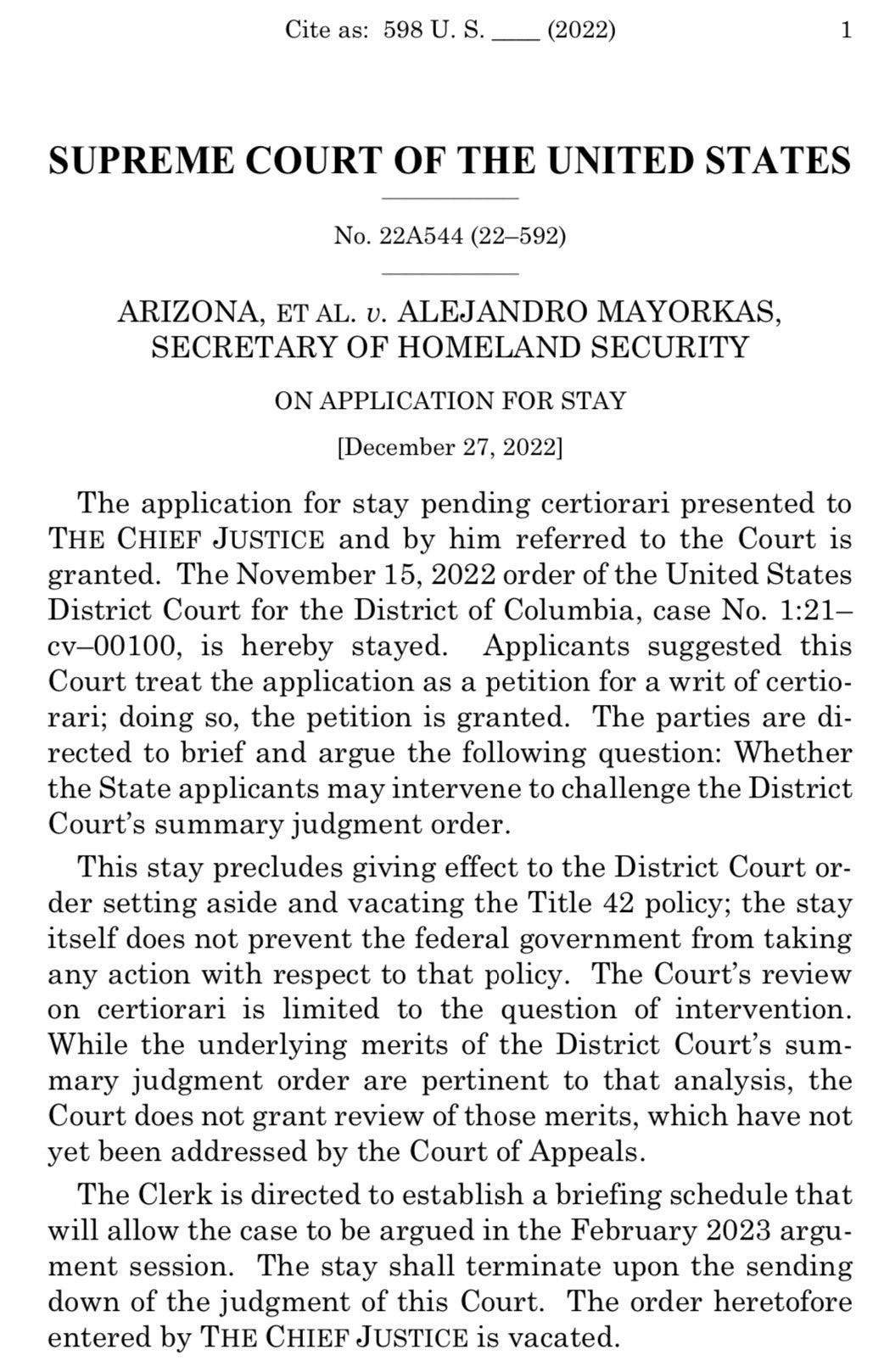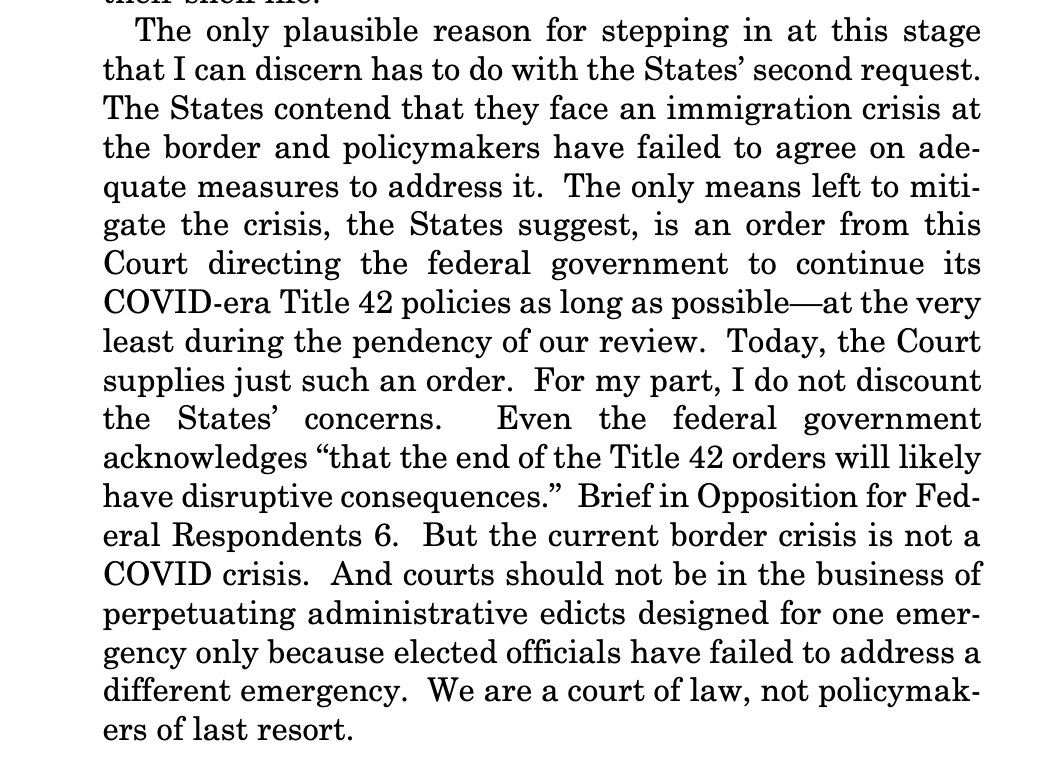Today we learned the fate of the request from 19 red-state attorneys general, who asked the Supreme Court to keep the Trump administration’s Title 42 policy in place after a federal judge ordered that it end. The Biden administration wants to stop the practice of expelling migrants under a provision of Title 42 of the United States Code (read the full provision here) that was supposedly implemented to prevent the spread of Covid-19.
When the Biden administration announced it would end the practice earlier this year, lower courts prevented it from doing so. The issue landed with the Supreme Court, after a District of Columbia judge ruled in favor of six families who ran afoul of the Title 42 policy when they crossed the border to seek asylum. They seek relief from the courts for themselves but also as a class action for all similarly situated people. Our laws generally permit people to seek asylum at the border or after entering the United States.
The Supreme Court has agreed to hear the states’ challenge to the Biden administration’s policy change. It entered a stay that will keep the restrictive measure in place while the case is being briefed and argued. Here is the Court’s order from Tuesday. You can read the full opinion, including the dissent authored by Justice Gorsuch, who sided with the liberal justices, here.
Title 42 of the United States Code deals with public health, social welfare, and civil rights. Under Trump, a rarely invoked provision of the 1944 Public Health Service Act was used to prevent migrants from entering the United States. While Title 42 gives the government the ability to take emergency action to stop the “introduction of communicable diseases,” beginning in 2020 it was used by the Trump administration to justify the “expulsion” of hundreds of thousands of migrants instead of permitting them to seek asylum, because their entry could increase the spread of Covid. Many of these people are not “illegal aliens,” a really unsavory way of characterizing people who lack legal status to be in the U.S., but rather legitimate asylum seekers who are legally entitled to make that claim at the border or after entering the country. The prior administration’s expansive use of Title 42 resulted in expelling adults shortly after entering the country, with no opportunity to seek asylum or receive due process rights.
A careful review of the states’ argument suggests they are not arguing that Title 42 is necessary for public health—and how could they when so many of them rejected measures like masking and proof of vaccination to slow the spread of Covid, saying it was unnecessary? Rather, they view it as border control, which is not the legitimate purpose underlying Title 42. The Supreme Court will have to decide whether it can now be used that way on a permanent basis even though it was always intended to be a public health tool, and a temporary one at that. Justice Gorsuch made that argument in his dissent to today’s order by the Court, agreeing to take the case on an expedited basis. Justice Jackson joined his opinion, while Justices Kagan and Sotomayor also voted against hearing the case.
The entire controversy highlights the repeated failure of Congress in both Democratic and Republican administrations to negotiate an immigration reform package and the need for sustainable immigration reform. Trump opposed aid to Central American countries like Guatemala and Honduras, failing to understand what members of Congress from both parties understood, that stabilizing conditions in those countries so their citizens felt safe and had opportunity was the best way to control immigration. But Trump always liked the option of using a crisis at the border as political theater. He was the master of invoking “caravans of criminals” that surfaced on the southern border predictably with every election cycle and then miraculously disappeared the day after the election, never to be heard from again. In reality, these are difficult issues that put real people’s lives in jeopardy and run the risk of making our country a pariah state that fails to give people the opportunity to seek asylum that is required by international law.
The graveyard of failed immigration reform measures is expansive. It’s an issue where politics has been permitted to trump responsible government, even to the extreme of dumping migrants on the streets of D.C. in freezing cold weather, as we saw on Christmas Eve. If you’re interested in more background, ProPublica has this excellent piece on how immigration reform got sidetracked during the Obama administration. Republicans pushed a plan during the George W. Bush administration in 2006, with Senator John McCain saying, after the bill suffered procedural setbacks in the Senate, that the “fight is not over. We’ll bring it up again and again ... until it passes, because the issue must be addressed.” Needless to say, it wasn’t then and still hasn’t been. A potential deal in the Senate fell apart before the end of the session just this month. There are no easy answers. Even the Trump administration’s family separation policy failed to provoke lasting outrage and change.
Last term, the Court decided Biden v. Texas, ending a Trump-era policy that required people to remain in Mexico while immigration proceedings were pending. It also decided Johnson v. Arteaga-Martinez and Garland v. Aleman-Gonzalez, where it limited the availability of bond hearings for detained immigrants; Egbert v. Boule, where it severely limited the ability of individuals to hold federal officers personally liable for unconstitutional actions; and Patel v. Garland, which drastically limited review of the findings made by overburdened and backlogged immigration courts. With the Supreme Court deciding pressing immigration issues with some regularity, it seems far more likely that they will shape immigration policy than Congress, at least in the short term. It’s a sorry state of affairs.
We’re in this together,
Joyce






Holy cats! I love this part:
----Brief in Opposition for Federal Respondents 6. But the current border crisis is not a
COVID crisis. And courts should not be in the business of
perpetuating administrative edicts designed for one emergency only because elected officials have failed to address a
different emergency. We are a court of law, not policymakers of last resort.
Wow is all I can say, coming from Gorsuch.
It is absurd for SCOTUS to take this up. For once I agree with Gorsuch; not their job.
now let’s do the ‘reverse’ - class action against Abbot for intentional risking the health of migrants.